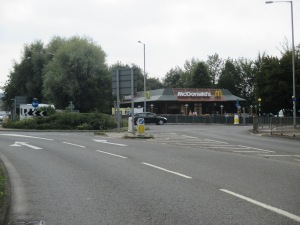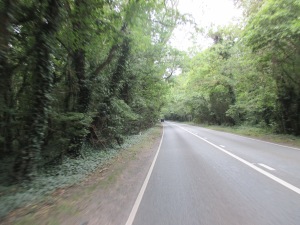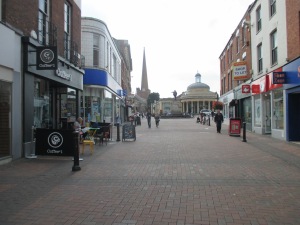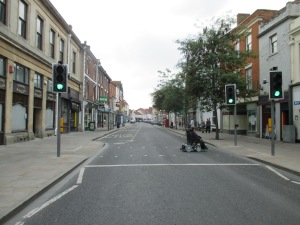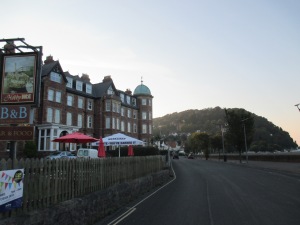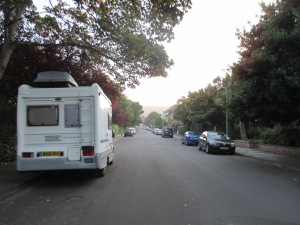‘We just sell things, we don’t make them.’ – Andy, Bridgwater.
I awake at Ellie’s after a good night’s sleep. I’m up early in fact, but the bright morning’s dedicated to the mundane business of emails arranging accommodation over these final weeks. By the time I’m up Ellie’s in the kitchen making tea and porridge. The sun is out, and she shows me more of the garden her and her mum have created from nothing in a mere nine months. There are few pleasures simples than the contemplation of life growing, thriving, in whatever form it takes.
It’s a perfect day for a bike ride – is every day not? But this September has been unusually hot, a fine relief after a rainy August, and today is especially sunny. So we cycle out to Glastonbury town. It’s bustling with an abundance of cafes, people leisurely sitting outside, and buskers in the background singing the counterculture hits of yesteryear. Middle-aged men and women share a unisex style of long-hair, tie-died clothes and leather waistcoats, and gently wander up the high street, past African art stores, esoteric bookstores, shops honouring the Goddess and the Green Man, and Glastonbury’s classic ‘Burns the bread’ bakers. We peer into the ruins of the abbey, sacked by the knights of Henry VIII, but don’t feel inspired to pay the charge. Then we head up to Glastonbury Tor, where many have come this sunny Sunday noon to watch the surrounding Somerset Levels.
The view from up here is marvellous. Ellie tells me this is ‘the place where things happen’, where the good people of Glasto go on Christmas Day, and where life’s special moments take place. Beneath the medieval church tower with centuries of graffiti etched inside, parents have posed with their new-born children who have then decades later returned again for first dates, family gatherings, perhaps even the arrival of grandchildren. The Tor’s an important place for Ellie as it is for others here, and for locals is iconic of the area as a whole. Against the surrounding plains, this is called the isle of Avalon, basking in its connotations of a mythic utopia.
Wearyall Hill looms in the distance. A very unusual thorn once grew on this hill, apparently produced from nothing when Joseph of Arimathea struck his staff. Local legends have it that Joseph of Arimathea brought Jesus here as a young man. Joseph was a wealthy trader who may have travelled from Judea to Cornwall to trade for tin and other minerals, and, on at least one visit, brought his nephew Jesus to see Cornwall, Devon, Stonehenge and the Mendips. This legend inspired William Blake to wonder ‘and did those feet in ancient time, walk upon England’s mountains green?’, later set to music in Jerusalem. It refers to here, Glastonbury, and this mountain green in the distance.
There is no credible evidence to prove that Jesus came here, or that Joseph was his uncle, or that thorn plants can magically grow in the ground when a holy man strikes his staff. Myths have no need for credible evidence for their propagation. Whether or not the story is a mishmash of medieval Arthurian speculations, Holy Grail wishwash, or canny marketing from the monks of the local Abbey isn’t essential. The hill has special meaning to Glastonbury, though sadly its thorn has been the subject of repeated attacks in recent years. Its branches were cut off in December 2010, and some crazies have continued to destroy subsequent saplings. Ellie tells me that people cried when the hawthorn tree was attacked that December.
We’re gazing across the Somerset levels, our eyes tracing an idyllic scene. Families picnic around us, and young people sit, laugh and laze around. Ellie describes how the whole area was flooded not so long ago. Local farmers blamed the Westminster government for freezing local council budgets, which had led to local rivers and flood defences not being adequately maintained. But the panorama right now is untroubled and at peace.
Ellie tells me about her chronic pain, and the difficulties in finding appropriate treatments. Alcohol helps, but it negatively impacts all the rest of her health. Smoking cannabis makes a big difference, ‘without the pain the next morning’. Progressive states in the US have begun legalising it for medicinal purposes. It seems absurd that decriminalisation hasn’t already occurred. At very least, for those with chronic pain or glaucoma, it should be available. But as with progressive taxation, electoral reform, and the public ownership of infrastructure, recent governments continue to mislead the public with scare stories that cow people into fearful obedience. In a society so terrifying, one needs strong conservative governments, right….? Whilst thousands die of conditions connected to alcoholism or are needlessly imprisoned for a drug dependency that ought to be considered a health condition, the real debate goes unheard. Drugs can be harmful, but let’s at least begin a discussion about their responsible and therapeutic use.
We cycle out back through the village then part ways by God’s Emporium. Ellie came here once for guided meditation, but the guru behind it quickly claimed to be the reincarnation of God. That’s a fitting anecdote to end my tour! I pick up supplies from the Co-op and fresh flapjacks from Burns, then head out west towards Bridgwater.
The road is busy but uneventful, and lacks the rural splendour of my Wiltshire way. The romance and dreaminess is quickly a distant memory, as I pass McDonalds drive-thrus and shabby yards promising the cheapest household appliances in the country. It’s relatively flat and agriculturally developed for the most part, though as I continue it begins to undulate more and more, until I’m every gear I possess to climb up and then whizz down one hill after another. I pass the Albion pub and truck stop, a recurring sign from the heavenly powers that something mysterious awaits down the way, and I take a breather by a busy car boot sale. Crap, tat and unwanted bric a brac. And pirate DVDs. The car boot sale offers a superb vantage to survey the culture of a place through its waste. Several daytime TV shows make much of the potential bargains to be found here, and there’s an animalistic excitement and thrill in acquiring bargains, gambling on junk and possessing juice blenders and broken video game consoles ordinarily beyond either interest or budget. One leaves in a state of heady intoxication. A week later, now sick of the piles on kitchen counters and dusty desks, one must gather one’s prizes and throw them in the bin, or else bring them to a boot sale of one’s own detritus. And so the junk continues in circulation.
I reach Bridgwater, an unusually large town for these rural parts which with its rusty yards, derelict pubs, crumbling trade-stores and ugly town centre suggests the faded dream of an industrial past. I step into in a humongous hypermarket with the scale and pull of a modern-day cathedral, where I buy fruit juice and ointments to treat an unpleasant condition I’ve been unable to shake off the last two weeks. Outside I talk to a grumpy local man happy to share his disaffection with an inquisitive stranger. Andy’s off to do his Sunday afternoon shop, though seems in no hurry to join the crowds inside Asda.
‘We used to have industries here. We don’t make anything now. There used to be British cellophane… Sweet wrappers. Pistons.’
The decline of Bridgwater frustrates and hurts him. His conversation is a mix of anger, exasperation, and regret. ‘This’, gesturing to distant and seemingly-disused building in the large car park where we stand, ‘was a shirt factory. They used to make clothes for the armed forces here’. ‘What happened?’ ‘Foreign competition’. He blames the loss of British contracts to American and European companies, from military equipment to nuclear power. His experience is drawn first hand, from his observations working at the nearby Hinkley nuclear plant. I sympathise with his arguments, though his frustrations are attached to a narrative of inevitable decline (‘this country’s gone to the dogs’), and he doesn’t take my observation that seriously when I suggest that these industries were allowed to collapse, and could’ve been preserved through government investment during the Seventies and Eighties.
Instead, he shares his worries about the future for young people now. ‘The 16 to 24 year olds, they don’t have a chance. The older ones are not retiring, not giving up their places. I guess they can’t afford to. But then when they get older they can’t get a job.’ Low-pay, insecure work contracts and a dearth of skilled employment are all problems facing us, the labour force, right now. But Andy’s right I think to emphasise the generational aspect. Those generations now retired or facing retirement grew up with opportunities in education and employment which have become either expensive or unfeasible. There was social housing and a welfare system that sought to protect and support the vulnerable. There were no foodbanks or cases of rickets, no prevalence of obesity, depression or anxiety disorders.
‘They’re building houses around here, but I don’t know how people can afford them. Maybe it’s some dot com thing. Or services, places like this [Asda], Lidl.’ The country has become a place incapable of producing, only selling. From a potted history of the railways, Andy leaps to the failure of British companies to produce nuclear power. Producing anything has become unthinkable. In lacking the means of production, workers have been deprived of one of the few means of power. Instead they service the buttons, following a pre-programmed formula, deskilled and easily replaced. The McDonaldisation of contemporary labour. Drop in, tune out and shut up. ‘It’s a shame’, he says, with melancholy.
Another local man repeats the same story, though with less poetic licence. ‘This place was going through a bad time. It had docking, industries. Now it’s on the way up.’ ‘Why, tourism?’, I ask, immediately aware of the absurdity of my suggestion. ‘It’s Hinkley, they’re building a new one. Tourists don’t really come here.’
The country is creaking. The lights are really on the verge of going out, hence the scramble for shale gas fracking, hence the reopening of mothballed power stations, hence the shit-ton of future government spending being committed to outmoded forms of nuclear power like that at Hinkley C. It used to be said that any country is three meals away from a revolution. Just how many days without the possibility of charging and using our phones, laptops, telephones and TVs could we manage? Local labour has, at the same time, become increasingly too de-skilled to maintain the country’s infrastructure, never mind produce new infrastructure. Employers complain about poorly-skilled school-leavers and then pay overseas workers cut-price wages. Yet capitalism does not creak, but instead thrives on a consistently high return of profit, as prices rise and living standards are allowed to diminish. Some horrible scenario awaits us. Most people sense it, and feel it, but the collective mental leap towards an alternative political narrative hasn’t been made. Instead protests of any kind gain in popularity, from incoherent marches against austerity to an ugly nationalist politics that blames the EU, the previous government or whoever else for the entropy around us.
It’s a hot afternoon, and the crickets whitter and creak on the grassy verges as I cycle out of Bridgwater and towards the Somerset seaside resort of Minehead.
It’s a long and undulating stretch, and though the bright afternoon sun is lovely and warm, with the increasingly challenging hills I’m becoming a sweaty mess. My westward road threads through the Quantock Hills, a lovely area of heathlands, moors and ancient forests untroubled since King Alfred led his guerrilla resistance campaign against the Vikings from the nearby swamps of Athelney. I ride through Nether Stowey, a village that was once home to the Romantic poet Coleridge. In his cottage here he wrote his most important works, Kubla Khan and The Rhyme of the Ancient Mariner.
‘Day after day, day after day,
We stuck, nor breath nor motion;
As idle as a painted ship
Upon a painted ocean.’
The Ancient Mariner is a haunting warning when humankind transgresses its symbiotic relations with nature, through the guilt and punishment for the killing of an albatross. The Quantocks remain suspended in time and ripe for romantic perambulations of the mind. I travel on, cycling thrugh the sleepy village of Williton, and past signs with the most quaint of instructions. Caution: cats crossing! May I say how happy these kinds of signs make me. Delighted, I detour through Old Cleeve and down to Blue Anchor, a seaside string of holiday cottages, fishermen and a bustling pub where anglers crane over a long promenade in the early evening sun.
Water, water everywhere and not a drop to drink… The prospect of the blissful sea and Minehead in the distance is enticing. The coastal path isn’t navigable by bicycle, contrary to expectations, so I rejoin the main road and pass through Dunster, its castle looming over the horizon, before taking a road into Minehead. It’s a small Victorian seaside resort dominated by a large Butlins holiday resort on its edge. I’ve come here several times before, mainly as a child, and again a couple of years ago for a music festival. On all those occasions I took no interest in the town or its surroundings. But they have an important place in recent social history. Billy Butlin’s holiday camps were established from the 1930s but became popularised particularly from the 1950s. They raised experiences (and expectations) of the average working-class family holiday with their provision of affordable accommodation and entertainment besides established seaside resorts across the UK. ‘Our true intent is all for your delight’, Butlin once said. Weirdly, this quotation has never left my mind since I saw it years ago.
What delights today? I peer into the empty rides of the depopulated theme park, then wander down towards the seafront. The Queens Hall looks regal and majestic, but is boarded up and shows no sign of interest. In those high windows, reflecting the sea, I imagine its eyes dreaming of former glory days, couples kissing and laughing as they spill out of its auditorium and onto the gaily-lit promenade. Next door, amusement arcades jingle and jangle to no-one. I get some much-needed salty chips and a honey and ginger ice cream. A queue of kids shout and wail to secure the attention of their parents, tantrums and tyrannical demands rudely, begrudgingly met. I look out over the golden sands, to the power station at Newport in the distance, and the old small harbour at Minehead nearby.
The town gets prettier the further one cycles into the town, which is surprisingly well-preserved, its Victorian character surviving in its prim little park, fawning statue to the queen and robust-looking high street. There’s a number of still-proud looking terraces where hotels and boarding houses once plied a trade. They’re not derelict, which is a relief. In fact it actually looks like Minehead might be a nice place to live, an unlikely result for the contemporary ex-seaside resort. There’s a few pubs plying a trade, and I’m tempted to stop, but I feel tugged by the wilderness that lies ahead. So reluctantly I head out along a back-road that threads up and west, out of the town and towards the full setting sun.
I have a tough ride ahead. There’s Porlock village, only a few miles west, but beyond that is one of the reputedly steepest hills in the country. It’s the evening and there’s perhaps around half an hour left of light. Can I make it? Or rather, where will I make it? For after Porlock is around fifteen miles of sheer nothingness…
I race on, out through the back of Minehead and along the A39. The bike is shattering me, til I realise that the front brake is now dragging against the wheel, just as the back brake dragged against the wheel until I reached Cardiff. It’s a frustrating discovery. Why does this bike choose to wait and save its psychodramas and breakdowns for moments like these, besides roadsides with very little light and nowhere obvious to stop? And so, I think, let’s take a photo. Lo, my camera stops working. Let’s hope it’s just the battery, but please, for anyone in contact with the deity of fortune and happenstance, please pass on this simple data request: why, bloody why?
There’s something darkly funny about it all, even if the joke’s at my expense. Whenever I fall over I make a rule of laughing first. The humiliation’s easier that way, and despair, well one can wrestle with that later. I laugh to myself as I realise there is no way of fixing it beyond simply tugging the brake pad back into position each time after I use it. Which will be a lot of times. Bizarrely, and I write this in retrospect, this fault picked up on the road to Porlock Hill stays with me for the rest of my cycling journey. I never get it fixed. Why, why, why…
But Porlock: a fine little village, twee, cramped, making the most of its literary associations with a Lorna Doone pub and curiosity shops in abundance. I head into the Royal Oak (?) and ask for travel directions. The guy and some of the regulars chuckle in sympathy about my plans to cycle any further. A car is suggested as an alternative. But lacking a combustion engine, my second best bet I’m told is to avoid the main road and take a narrow and obscure toll road, along the narrowest of tracks several miles away, ‘though I wouldn’t do either myself!’
So, scaling a huge hill by way of an obscure and poorly-marked toll road, in the middle of nowhere, with the bare minimum of visibility: nothing can go wrong eh?
I follow a narrow track up to West Porlock which forks by Porlock Weir. After this it’s a very narrow and dark trail that steeps up, occasionally plunges down, then reaches ‘Worthy toll’, an old gate. Bicycles aren’t allowed. The toll is £2 for cars and 50 pence for motorbikes. It’s too dark to turn around now, so I decide to become a motorbike and drop my change into the box, and head up the track, strangely absent of fear. The road winds through an overgrown forest which obscures most of the light, and the track is both broken and very steep. It’s very tough cycling. I manage to make it up the first half of the bending hill through the woods, then give up and push for a while.
It quickly becomes very dark, and I can no longer make out the difference between the bumpy road ahead and the dust-path horizon in the distance. By the dark forest is a whooshing river and an occasional unoccupied building, adding to the spooky effect. Yes, I am all alone, and the nearest living soul is at least three miles behind me. I quickly rule out the temptation to camp in this isolated and damn eerie place. I push on, though am unsure where exactly I’m pushing, and eventually reach what I suppose to be the top of Porlock Hill. I follow a zigzagging series of lanes past fields of grey sheep.
Whoever this deity of happenstance happens to be, I thank them for escaping that eerie and unpleasant forest. But now I am at the very top of something, though I’m unsure what, or where. There is no phone signal here, so no means of checking my phone’s map or of contacting my partner. It is also pitch-black. Aided by the lights of the stars and a full moon, I manage to follow what I judge to be the road up. I’m simply looking for a place to wild-camp, but with it being so dark I cannot tell which fields have livestock in and which do not.
In the distance I see the sea and the lights of what I imagine to be Cardiff or Swansea on the other side. There are strange noises sound in the distance. Keeping a tight rein on a weary mind prone to fantastic imagination, I rule it to be animals mating, and carry on. I push the bicycle now, not wanting to cycle with too much speed to then have my progress interrupted by a hedgerow.
Eventually I find a clearing with a gate. I have a bar of reception, and reasonably sure it’s ok, I pitch up my tent and settle down. I peer up at the stars a while, my constant companion out on the road, then speak to my wife and my sister, eat a familiar dinner of kidney beans and spinach in tortilla wraps, before bedding down. For the first time in my life I hear and experience silence. There are no road-lights, no human beings, no cars, no nothing on this distant Exmoor plain. I have no idea where I am, and at this moment this does not concern me. Instead, for guidance tonight are the hoot of the owls, of foxes mating in the fields, and the distant lowing of livestock. All this, and the hint of an autumn chill. For this one moment, among nowhere, among nothing, here I sleep. This tranquillity and peace is something one can never forget.

























